News | Tuesday, 15 December 2020
Academies call for prompt action to protect and increase biodiversity in the agricultural landscape
The biodiversity in Germany's agricultural landscape has declined considerably in recent years, even in nature reserves. In their joint statement “Biodiversity and Management of Agricultural Landscapes – Wide-ranging action is now crucial”, the German Academies of Sciences make recommendations in eight fields of action. In addition to the statement, the Leopoldina provides a digital dossier that presents the topic in a clear and interactive way.
They state the protection of biodiversity as an urgent and complex challenge. A change in society as a whole towards sustainable farming is required. It is important to also take the economic, political, legal, and social parameters of agriculture into account. Thus, the scientists recommend a systematic approach, implementing a variety of solutions at the same time. As the most important starting point, subsidies paid to the agricultural industry as part of the Common Agricultural Policy of the European Union (CAP) should be more closely tied to quantifiable ecosystem services that have actually been provided.
The observed decline in biodiversity in Germany's agricultural landscape will perspectively restrict the functionality of agro-ecosystems and have noticeable consequences for human society and the environment. The experts point out that the value of biodiversity cannot be assessed purely based on economic criteria. They attribute the decline in animal and plant species to a combination of numerous factors such as intensified land use and biological and technical innovations to increase production. The authors of the statement see an acute need for action to protect and promote biodiversity in the German agricultural landscape.
Future framework conditions should actively support farmers in managing their farms in a biodiversity-friendly manner. According to the scientists, a combination of the proposed measures would not only halt the decline of biodiversity in the agricultural landscape, but also reverse it. The statement outlines courses of action in eight areas:
1. Further development of agricultural and conservation policies at European and national level: The academies recommend, among other things, a tighter coupling of agricultural and conservation policies. CAP support should be focused on specific targeted conservation measures, and subsidy payments to agriculture should be linked to actual quantifiable ecosystem services.
2. Adaptation of agricultural and environmental laws: The introduction of an EU-wide agricultural law would enshrine in law environmental protection regulations for farms while avoiding any distortion of competition within the EU. Shortfalls in enforcing existing legislation need to be eliminated.
3. Development of plan-based, region-specific collective approaches: The aim of such adjustments in landscape planning is a modified land use through close cooperation of all parties involved. Perspectively, some areas should either cease to be used for farming production, or they should be farmed much less intensively.
4. Responsibility of the municipalities: As visible pioneers and opinion leaders of a biodiversity-friendly way of life, they should be more committed to preserving, fostering and increasing biological diversity on their land.
5. Influence through trade and markets: Products farmed locally in biodiversity-friendly conditions should be labeled with this information when being sold. In addition, the development of infrastructures should be promoted that allow agricultural products to be further processed locally. Food losses must also be reduced.
6. Support for farms: Biodiversity-friendly farming can and must be economically viable. Farms should be supported in implementing of appropriate farming methods and they need to be given greater support if they choose to invest in conservation measures for their holdings. Ideas beyond organic farming need to be expanded upon and continually developed, focusing on integrated farming methods with small-scale technical or large-scale digital support.
7. Change in social perception and appreciation: Awareness of the importance of biological diversity in the agricultural landscape should be fundamentally strengthened and must also be reflected in changed consumer behavior. It is particularly important to increase the willingness to buy biodiversity-friendly products and to reduce meat consumption.
8. Expansion of monitoring and research: Long-term, nationwide, standardized monitoring and research are needed to verify the effectiveness of the measures implemented to protect biological diversity. The monitoring system should document changes to a broad, representative range of species and habitats.
The Academies' working group “Biodiversity in Agricultural Landscapes is headed by Prof. Dr. Katrin Böhning-Gaese, Director of the Senckenberg Biodiversity and Climate Research Center in Frankfurt am Main, Prof. Dr. Alexandra-Maria Klein, Professor of Nature Conservation and Landscape Ecology at the University of Freiburg, and Prof. Dr. Wolfgang Wägele, former Director of the Zoological Research Museum Alexander Koenig in Bonn.
The statement is a joint contribution by the German National Academy of Sciences Leopoldina, acatech – National Academy of Science and Engineering, and the Union of the German Academies of Sciences and Humanities. The Academies provide policymakers and society with independent, science-based advice on issues of crucial importance for our future.



